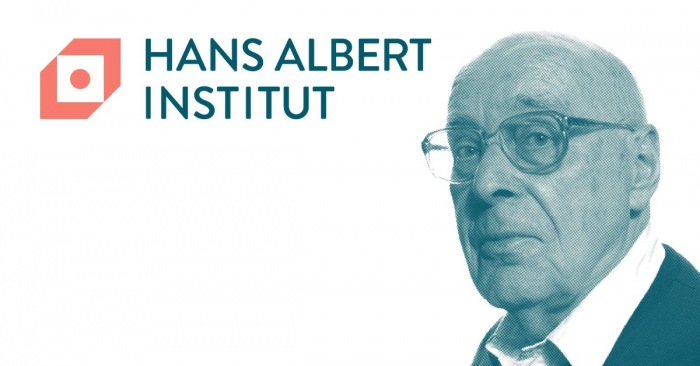Institute Founded on Hans Albert's 99th Birthday
The Hans-Albert-Institute promotes critical-rational thinking in politics and society
Perhaps he is the only living person who has succeeded in becoming friends with the antipodes Karl Popper and Paul Feyerabend simultaneously: Today, Saturday, the great science theorist Hans Albert celebrates his 99th birthday. In his honour, the Giordano Bruno Foundation is launching the Hans Albert Institute, which aims to foster critical-rational, evidence-based thinking.
Unlike Jürgen Habermas, with whom he once engaged in the so-called "positivism dispute", Hans Albert is today largely ignored by German feature pages. In the international scientific community, on the other hand, the "principle of critical examination" propagated by Albert and Popper plays a prominent role. In the meantime, Albert's theses have even found their way into global pop culture - which can be seen, for example, when Sheldon Cooper, the physics and science nerd of the successful comedy series "The Big Bang Theory", used the "Münchhausen Trilemma" as described by Hans Albert to free himself from a precarious situation.
Born 99 years ago on February 8, 1921 in Cologne, Albert studied economics and sociology in his home town in the postwar period. After completing his dissertation (1952) and habilitation (1957), he was appointed to the newly created Chair of Sociology and Science in Mannheim in 1963, where he remained until his retirement in 1989 despite several appeals to other universities. Albert established himself as one of the main representatives of critical rationalism with his 1968 book "Treatise on Critical Reason", which quickly became a classic of modern philosophy. For his outstanding achievements in the field of sociology and scientific theory, he received honorary doctorates from the universities of Linz (1995), Athens (1997), Kassel (2000), Graz (2007), and Klagenfurt (2007). Albert is an elected member of the "Academia Europaea", co-editor of the journal "Aufklärung und Kritik" ("Enlightenment and Critique"), honorary president of the "Gesellschaft für kritische Philosophie" ("Society for Critical Philosophy") and (since its founding in 2004) advisory board member of the Giordano Bruno Foundation.
The name obliges: On the Hans Albert Institute (HAI
Since nothing and nobody is infallible, statements, assertions, and theories must be subjected to constant critical examination. This is the quintessence of Hans Albert's philosophy and also the objective of the institute bearing his name. The HAI's aim is to anchor the critical-rational problem-solving strategies developed by Hans Albert more firmly in politics and civil society. Thematically, the Institute will focus on the decision-making processes associated with ethical conflicts (e.g. questions of assisted dying, abortion, or bioethics), since especially with such "sensitive issues" a critical-rational, evidence-based, and ideologically neutral approach is indispensable.
As the newly launched website of the Hans-Albert-Institute shows, the HAI has been able to draw on an impressive body of renowned experts and professors from various scientific disciplines since the very beginning. This, too, corresponds to a central aspect of Albert's philosophy, which in accordance with a transdisciplinary approach presupposes a "unity of knowledge" and overcomes the traditional rifts between the natural, social, and human sciences.
The HAI is financed by the Giordano Bruno Foundation, which developed the Institute's concept as part of its annual theme "The fine art of rationality: facts, fakes and perceived truths". Foundation spokesman Michael Schmidt-Salomon is convinced that the Hans Albert Institute will be a fruitful project, as it closes a communication gap between science and politics:
"The Institute seeks to illuminate complex social problems on the basis of human rights, while remaining as unaffected as possible by political ideologies, ideological prejudices, or lobbyist interests. Particularly in today's debates, characterized by moral indignation and identitary camp thinking, we consider such a critical-rational approach to be necessary. For it is more important than ever to tackle hot issues with a cool head, which means that we must not fall into neither the dogmatism nor the postmodern trap of arbitrary thinking. Hans Albert has shown how to avoid these dead ends. It is now up to us to apply these techniques to the relevant problems of our time, such as questions of environmental protection, resource distribution, bioethics, or the opportunities and risks of artificial intelligence. The Hans-Albert-Institute aims to contribute to this process."
Board of Directors: Florian Chefai, Adrian Gillmann, Prof. Dr. Dr. Eric Hilgendorf, Prof. Dr. Andrea Maurer, Dr. Dr. Michael Schmidt-Salomon, Sophie Strobl, Prof. Dr. Franz-Josef Wetz
Advisory Board: Prof. Dr. Gert Albert, Kurt Albert, Prof. Dr. Max Albert, Dr. David Bardens, Dr. Tanja Gabriele Baudson, Prof. Dr. Dieter Birnbacher, Prof. Dr. Michael Braungart, Helmut Fink, Dr. Natalie Grams, Prof. Dr. Hartmut Kliemt, Prof. Dr. Horst Marschall, Prof. Dr. Reinhard Merkel, Dr. Nikil Mukerji, Prof. Dr. Armin Pfahl-Traughber, Amardeo Sarma, Prof. Dr. Beda Stadler, Prof. Dr. Gerhard Streminger, Rüdiger Vaas, Prof. Dr. Eckart Voland, Prof. Dr. Dr. Gerhard Vollmer, Prof. Dr. Ulla Wessels.
Website: https://hans-albert-institut.de

